Citizen scientests are welome. Participants can submit their findings online at.
Flies could be the back-up answer to pollination for farmers as bee numbers plummet
Citizen scientests are welome. Participants can submit their findings online at.
Flies could be the back-up answer to pollination for farmers as bee numbers plummet
roughbarked said:
Citizen scientests are welome. Participants can submit their findings online at.Flies could be the back-up answer to pollination for farmers as bee numbers plummet
wookiemeister said:
roughbarked said:
Citizen scientests are welome. Participants can submit their findings online at.Flies could be the back-up answer to pollination for farmers as bee numbers plummet
I could breed trillions of flies in my neighbourhood and be hailed a hero
We all do but none of us think it is heroic.
wookiemeister said:
roughbarked said:
Citizen scientests are welome. Participants can submit their findings online at.Flies could be the back-up answer to pollination for farmers as bee numbers plummet
I could breed trillions of flies in my neighbourhood and be hailed a hero
They have to be the right type of flies. Carrion flies and those that live in s&*t don’t count.
PS. I asked an insect expert to identify a new type of small fly for me. His answer “diptera”. I burst out laughing.
I’ve been noticing the presence of a lot of insects I don’t recognise right now. Two I didn’t recognise were on the back window of the car as I drove in yesterday. Another on the front door fly screen last week.
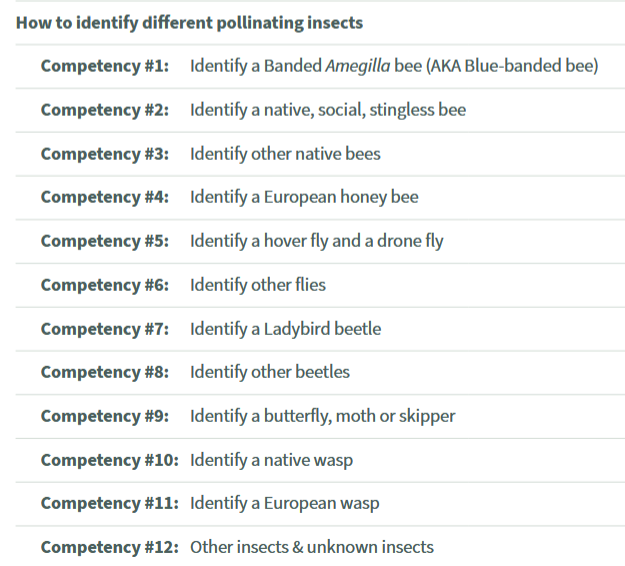
mollwollfumble said:
wookiemeister said:
roughbarked said:
Citizen scientests are welome. Participants can submit their findings online at.Flies could be the back-up answer to pollination for farmers as bee numbers plummet
I could breed trillions of flies in my neighbourhood and be hailed a hero
They have to be the right type of flies. Carrion flies and those that live in s&*t don’t count.
PS. I asked an insect expert to identify a new type of small fly for me. His answer “diptera”. I burst out laughing.
I’ve been noticing the presence of a lot of insects I don’t recognise right now. Two I didn’t recognise were on the back window of the car as I drove in yesterday. Another on the front door fly screen last week.
I provide habitat and food plants. I don’t spray chemicals = I get heaps of insects. I’ve seen thousands of hover flies hatch out in my garden.
Pollination would be one area where if the natural version of it collapses, the technological version would be extremely difficult and expensive.
Cymek said:
Pollination would be one area where if the natural version of it collapses, the technological version would be extremely difficult and expensive.
Not totally true but I’ll digress. If you plant what attracts them, you’ll easily get the beneficence of our native pollinators.

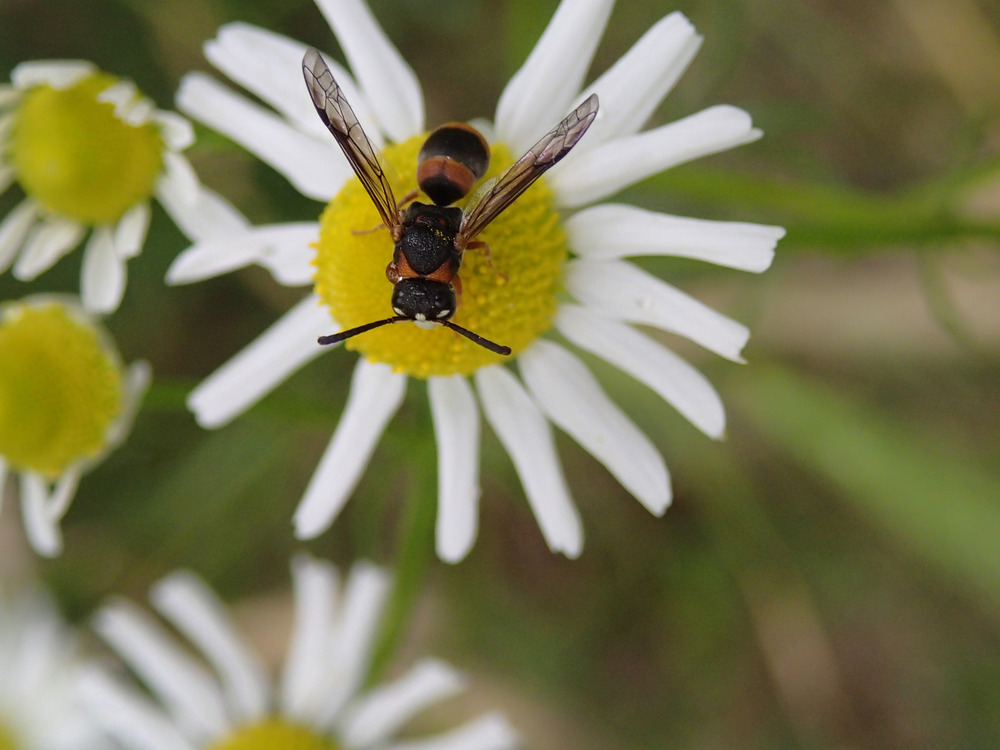
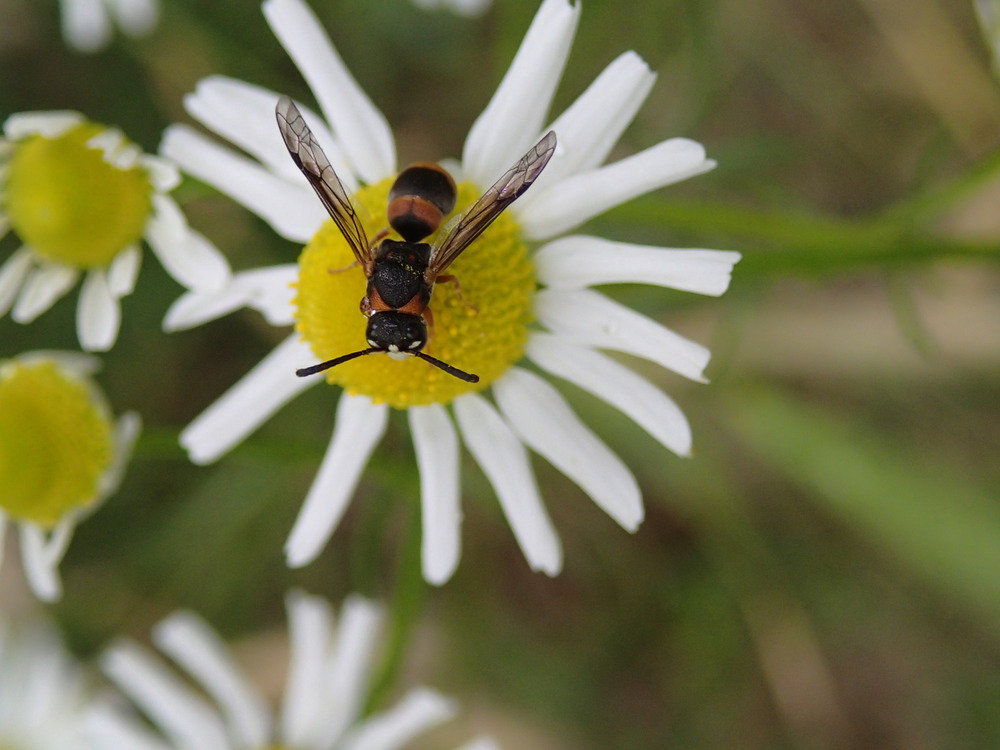
The flower is Anthemis nobilis. Chamomile.
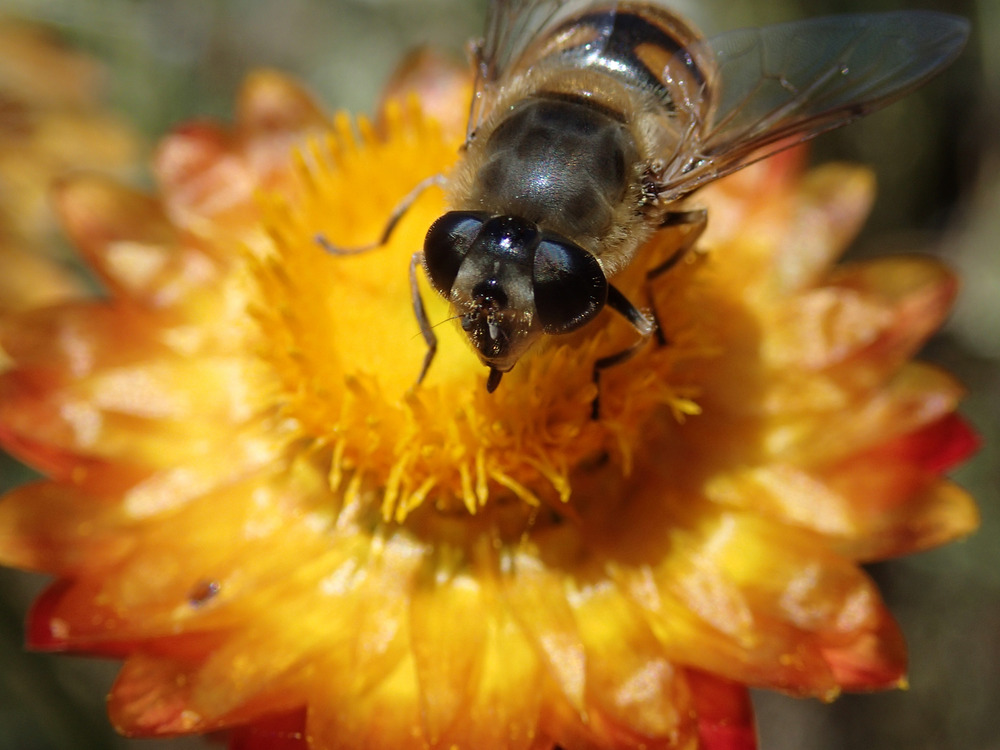
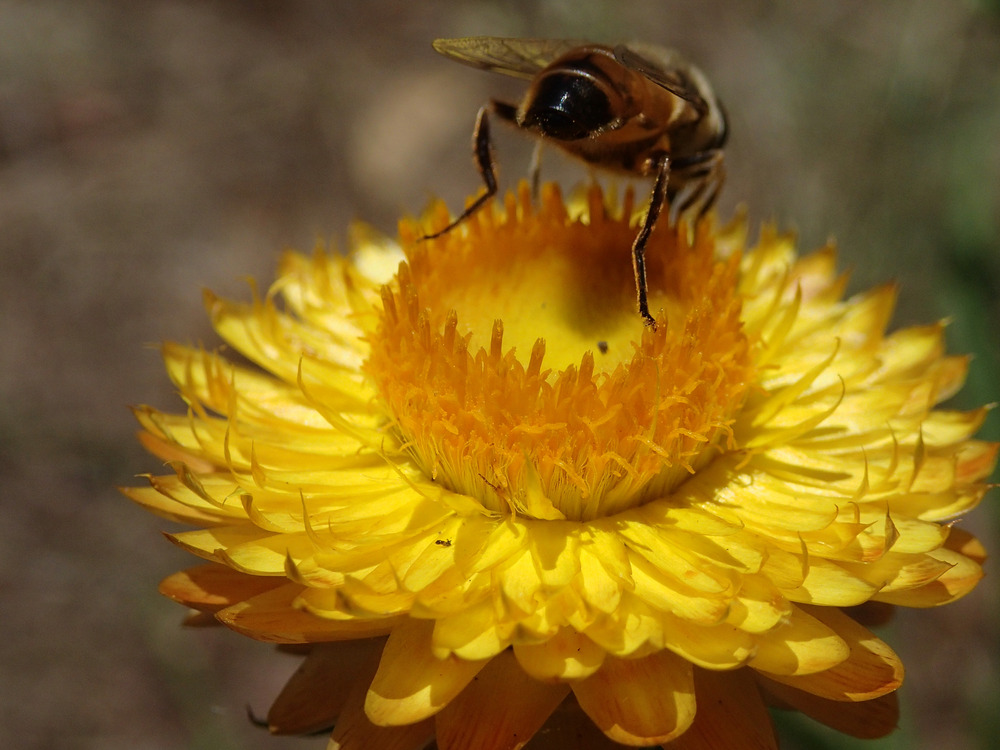
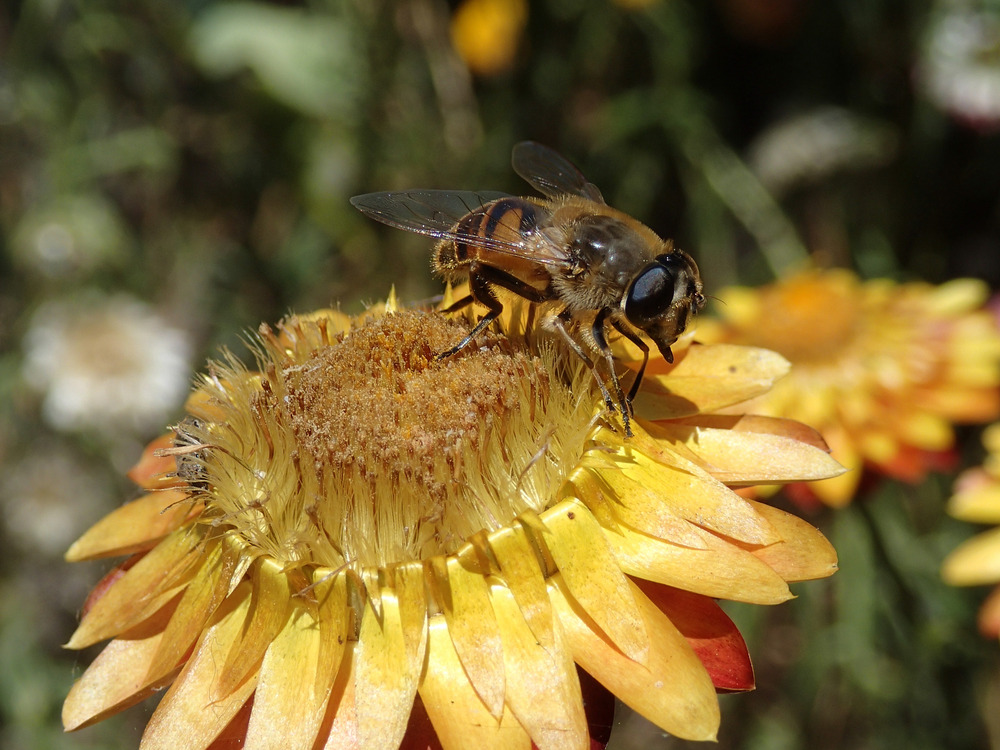
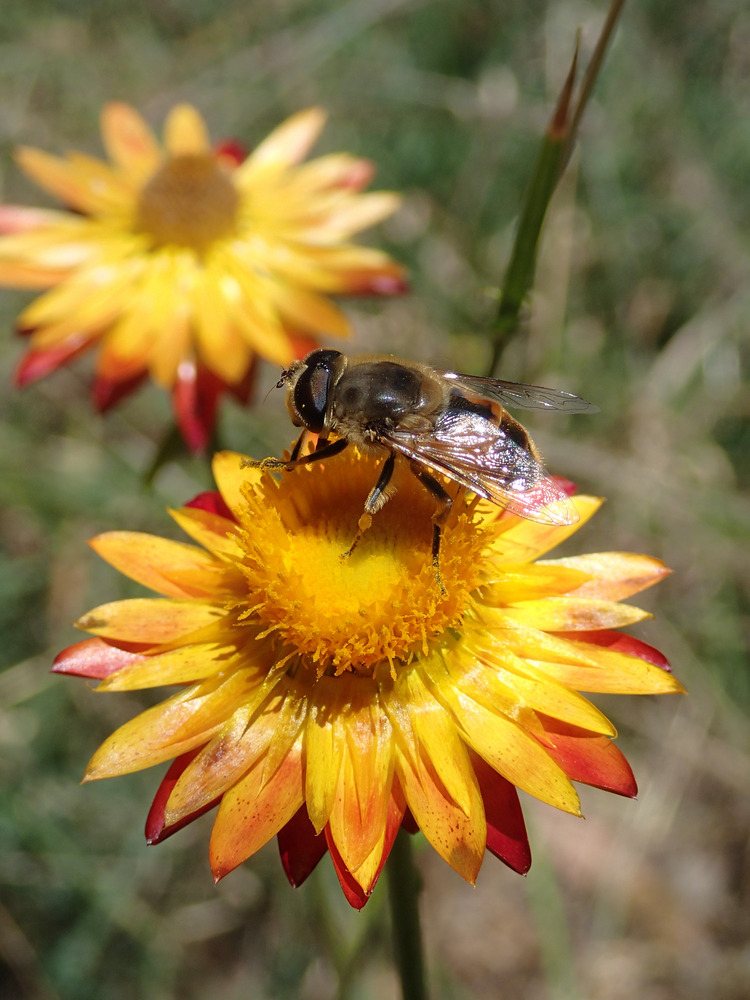
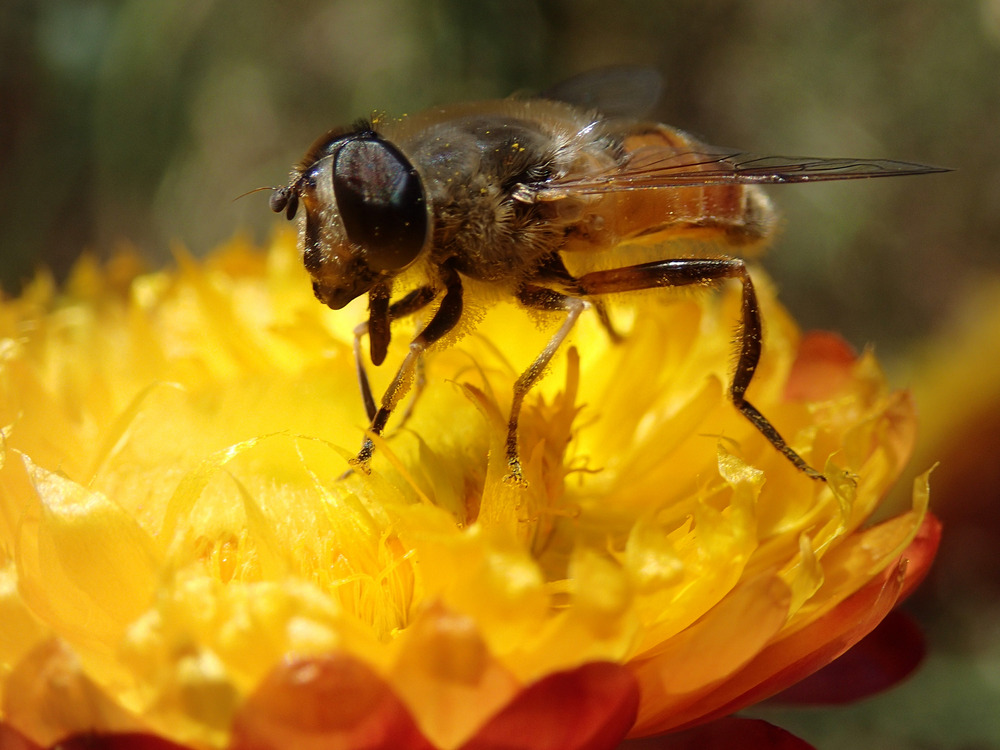
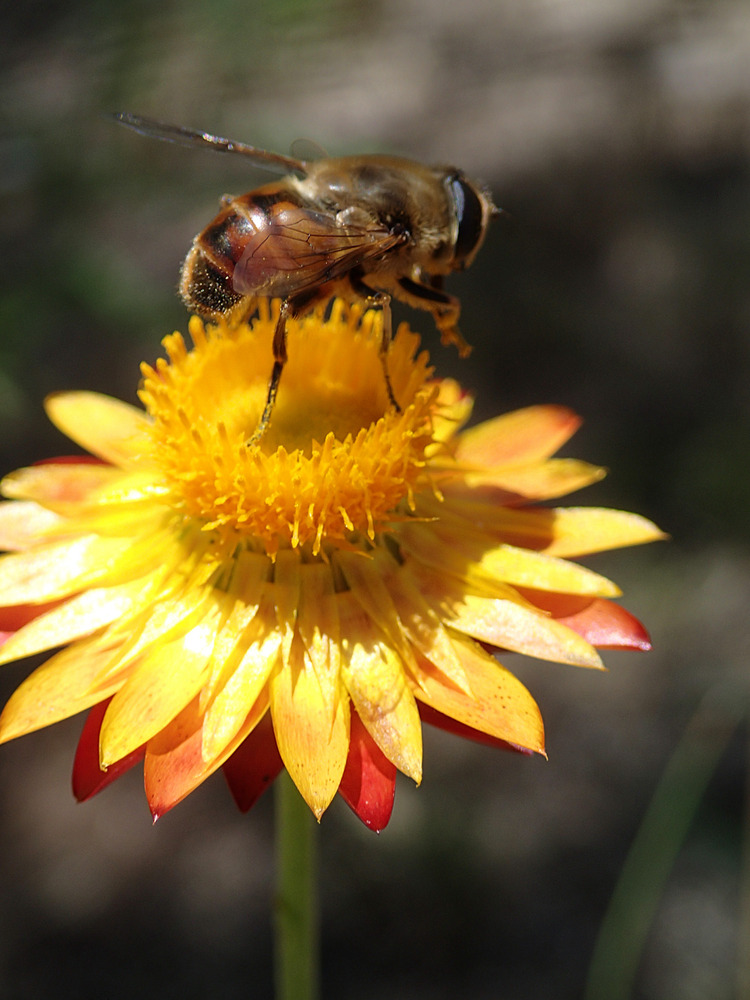
Nods to Moll, these are all, Diptera. ;) Two species of bee flies.
roughbarked said:

Nods to Moll, these are all, Diptera. ;) Two species of bee flies.
Fine snaps as always.
Bubblecar said:
roughbarked said:

Nods to Moll, these are all, Diptera. ;) Two species of bee flies.
Fine snaps as always.
Bees are reasonably cooperative for photos as they hang around on the flowers for a number of seconds or longer
Cymek said:
Bubblecar said:
roughbarked said:

Nods to Moll, these are all, Diptera. ;) Two species of bee flies.
Fine snaps as always.
Bees are reasonably cooperative for photos as they hang around on the flowers for a number of seconds or longer
They aren’t bees. They are flies pretending to be bees.
roughbarked said:
Cymek said:
Bubblecar said:Fine snaps as always.
Bees are reasonably cooperative for photos as they hang around on the flowers for a number of seconds or longer
They aren’t bees. They are flies pretending to be bees.
That they are, looking closer
Cymek said:
roughbarked said:
Cymek said:Bees are reasonably cooperative for photos as they hang around on the flowers for a number of seconds or longer
They aren’t bees. They are flies pretending to be bees.
That they are, looking closer
and none dare tarry long.. 
roughbarked said:
Cymek said:
roughbarked said:They aren’t bees. They are flies pretending to be bees.
That they are, looking closer
and none dare tarry long..
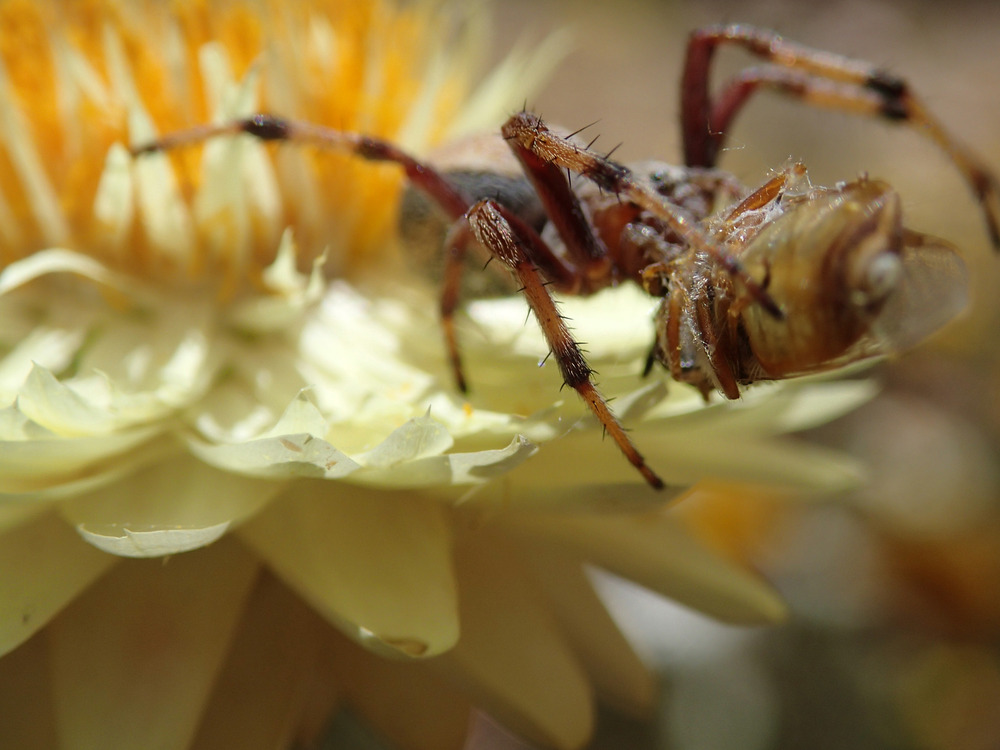

mollwollfumble said:
wookiemeister said:
roughbarked said:
Citizen scientests are welome. Participants can submit their findings online at.Flies could be the back-up answer to pollination for farmers as bee numbers plummet
I could breed trillions of flies in my neighbourhood and be hailed a hero
They have to be the right type of flies. Carrion flies and those that live in s&*t don’t count.
PS. I asked an insect expert to identify a new type of small fly for me. His answer “diptera”. I burst out laughing.
I’ve been noticing the presence of a lot of insects I don’t recognise right now. Two I didn’t recognise were on the back window of the car as I drove in yesterday. Another on the front door fly screen last week.
In relation to your comment about carrion flies and blowflies not being pollinators.
Evidence to the contrary can be douund in my photos.
ie: here’s one;

and another;

oops doound was meant to be spelled found.
Finding more flies pollinating flowers.
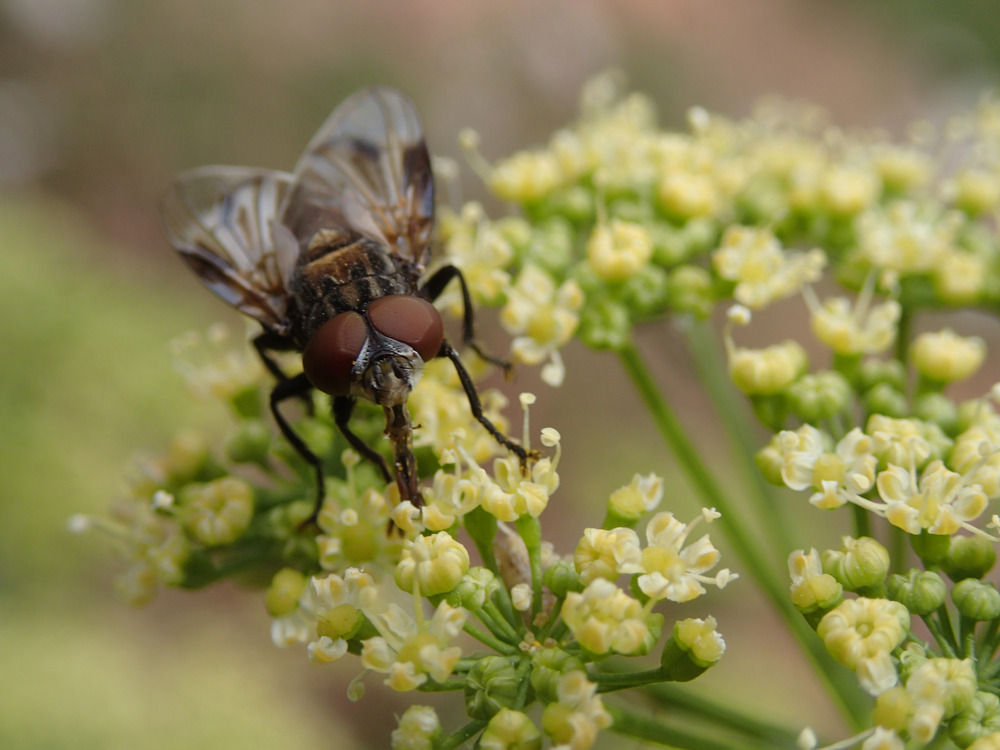
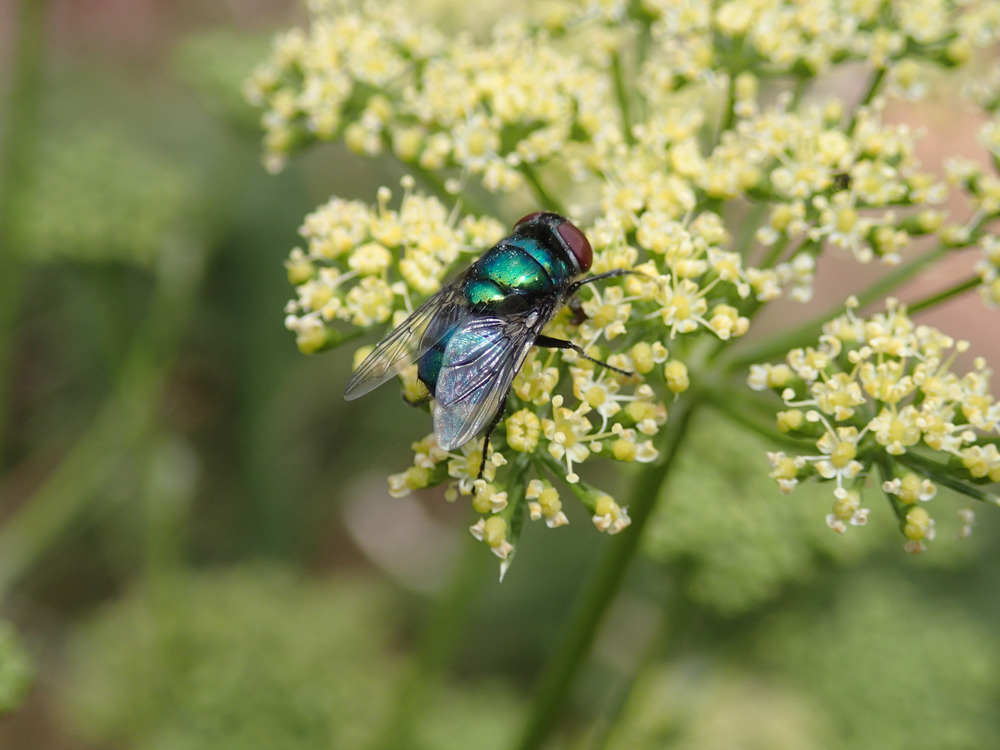
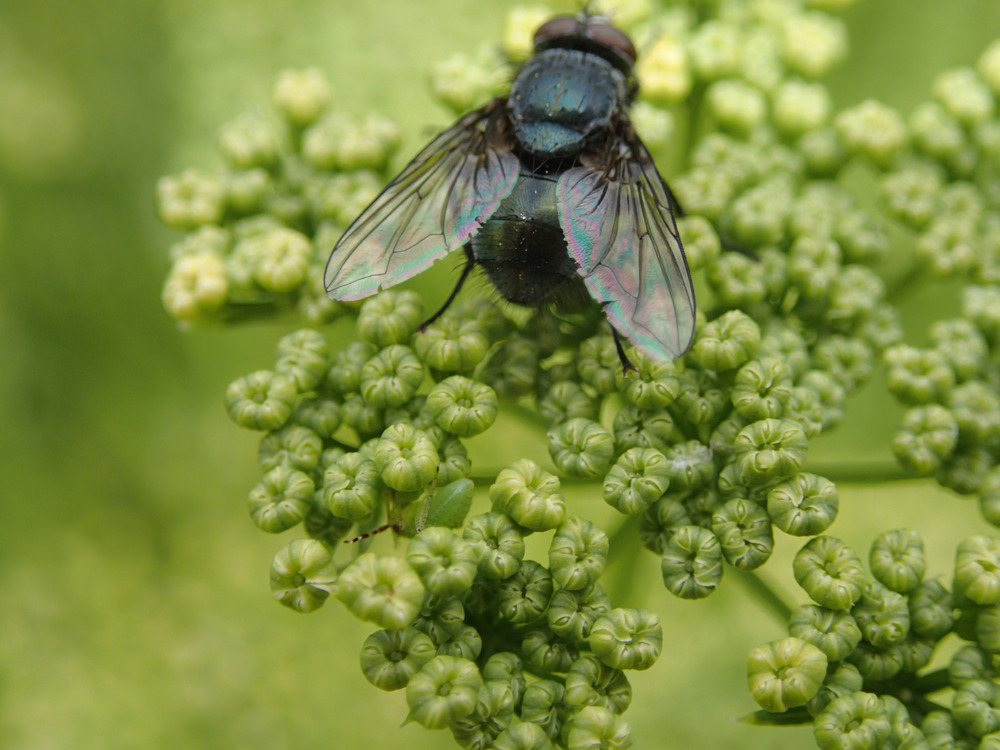
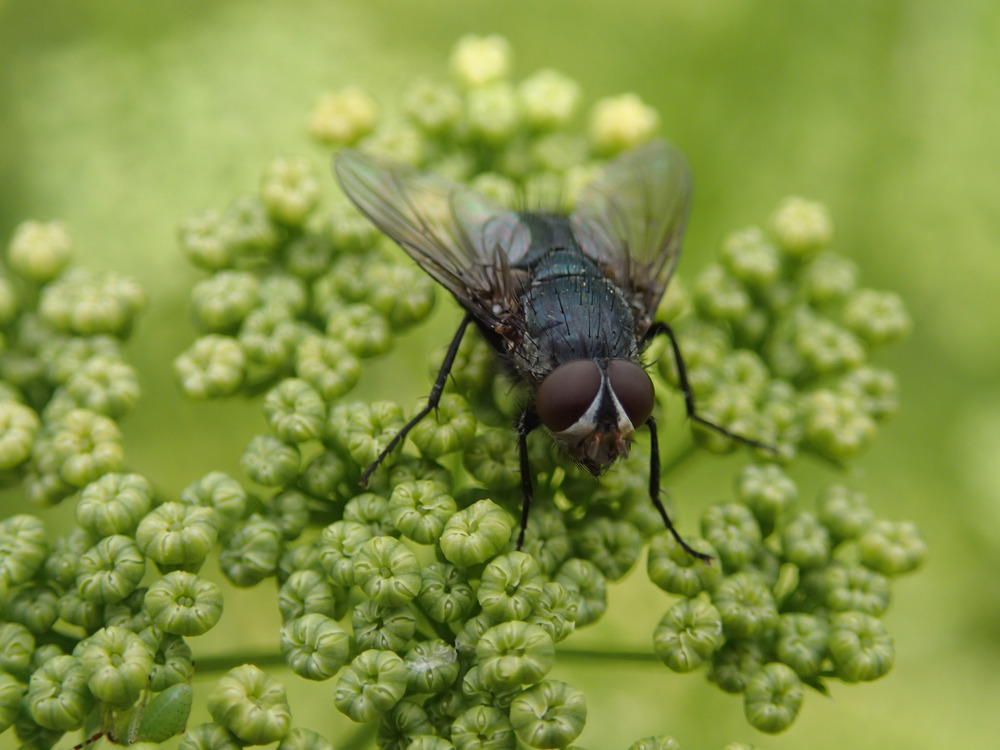
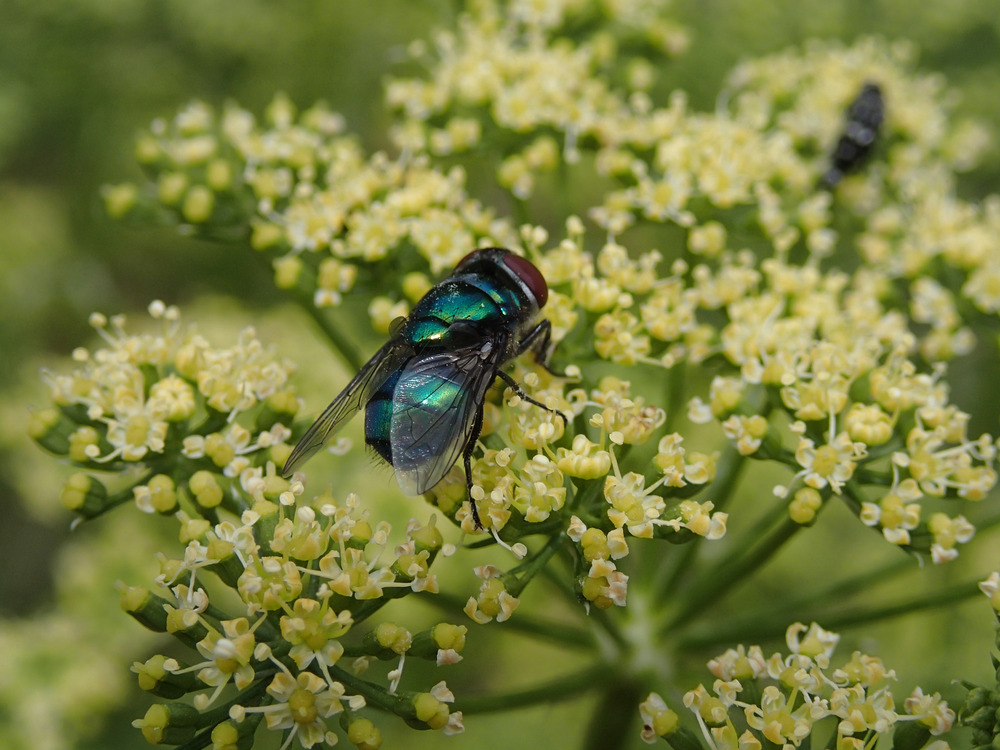
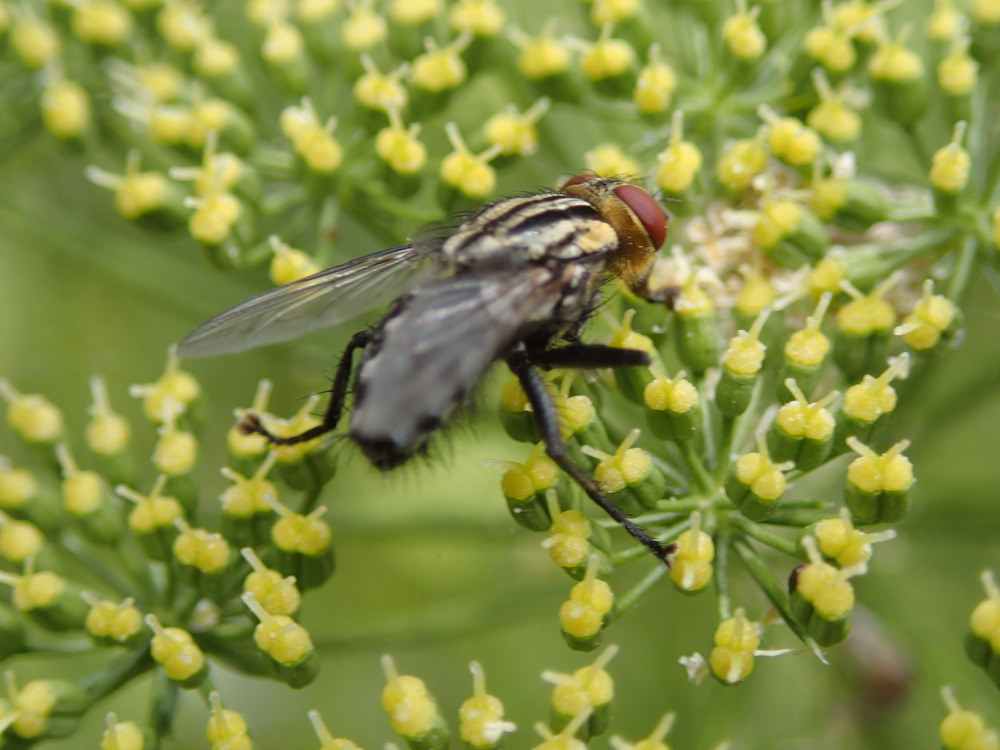
Now this one is interesting.
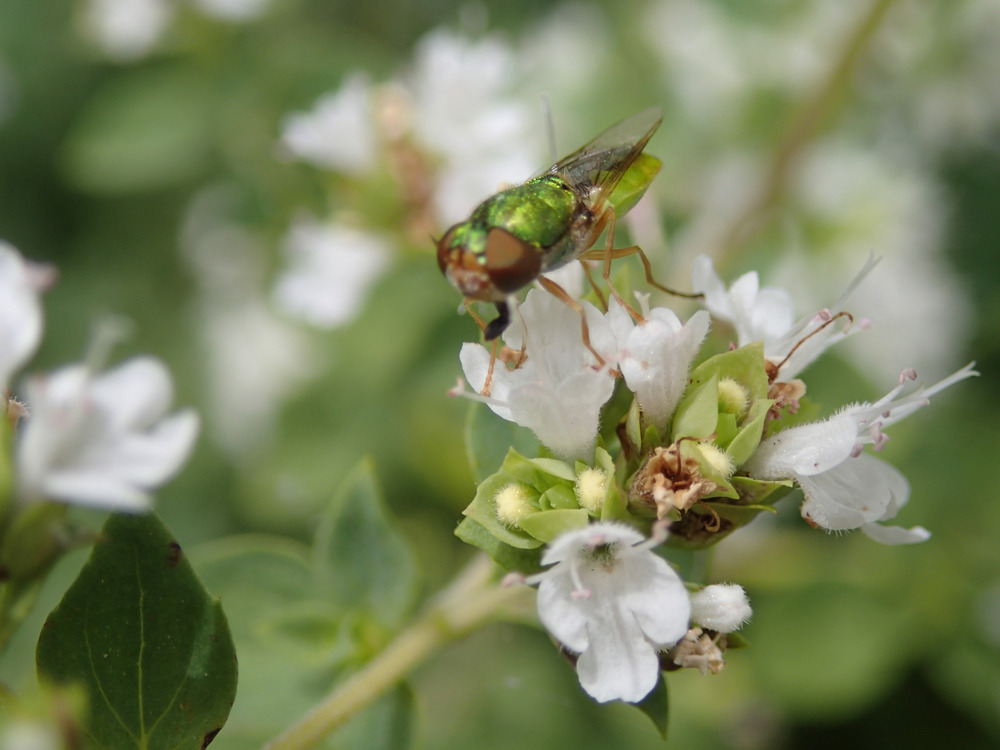
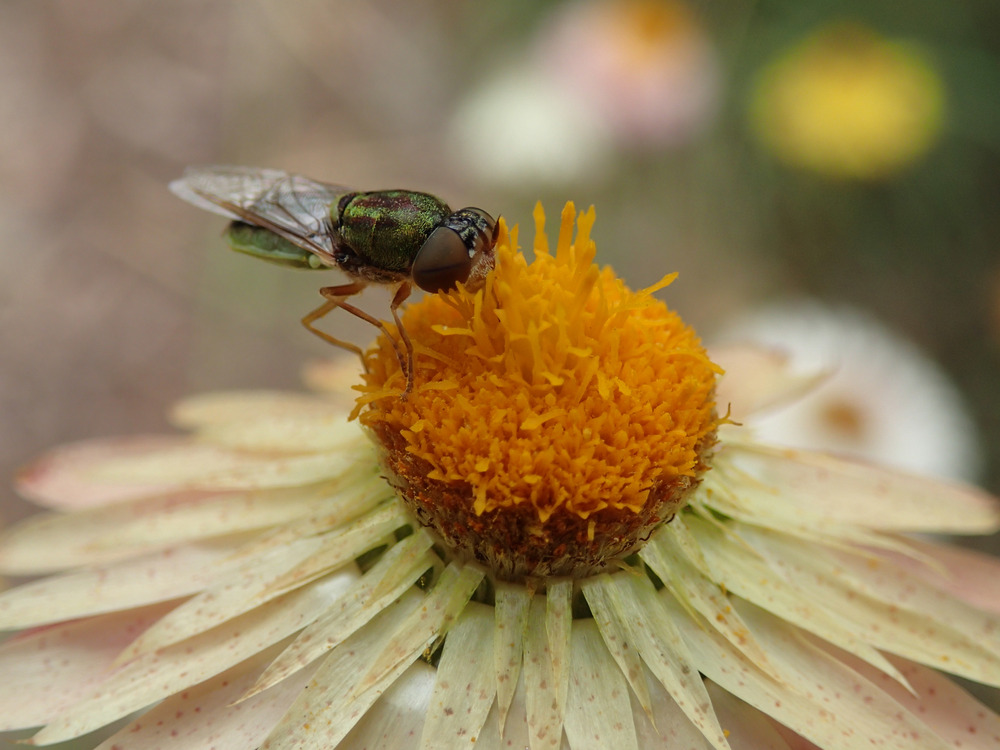
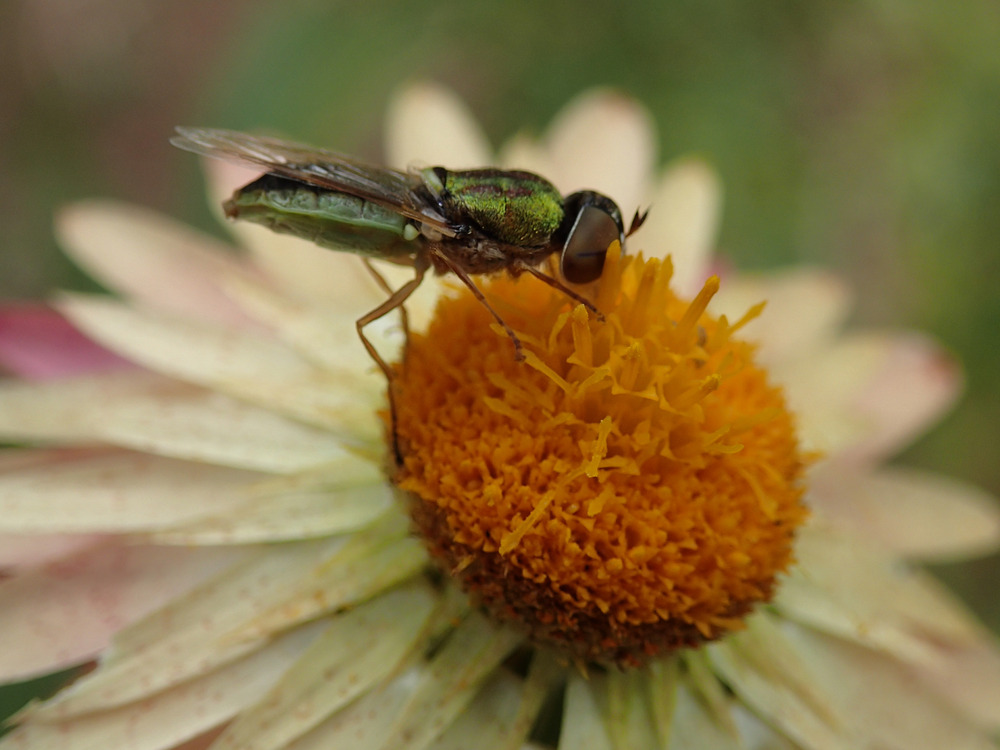
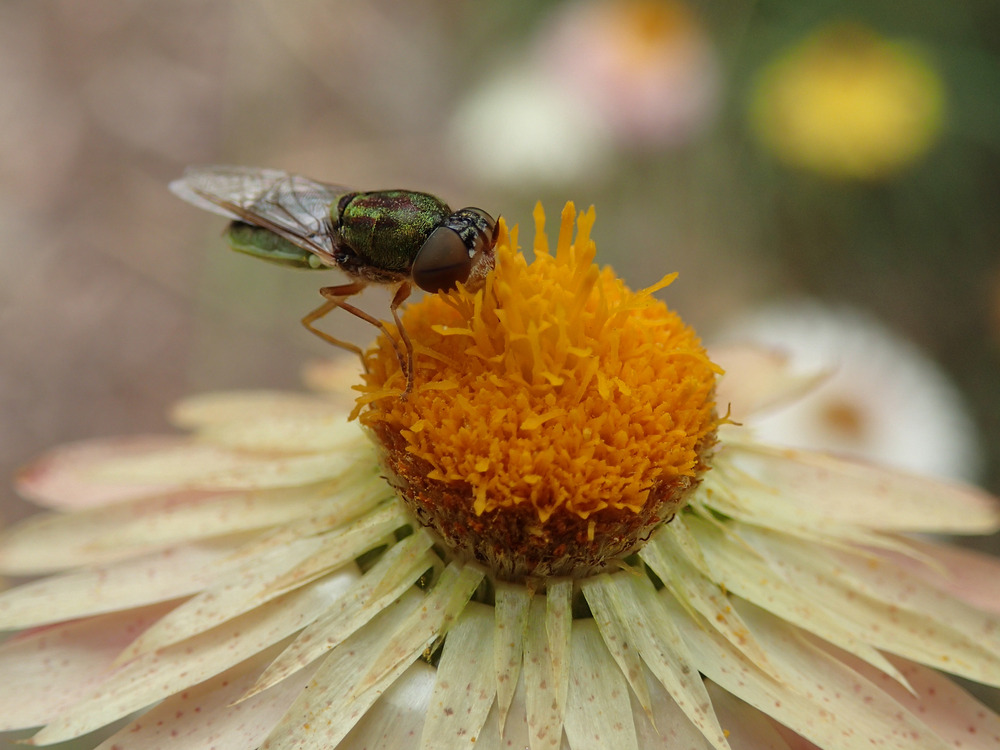
This I’m sure is not a fly.

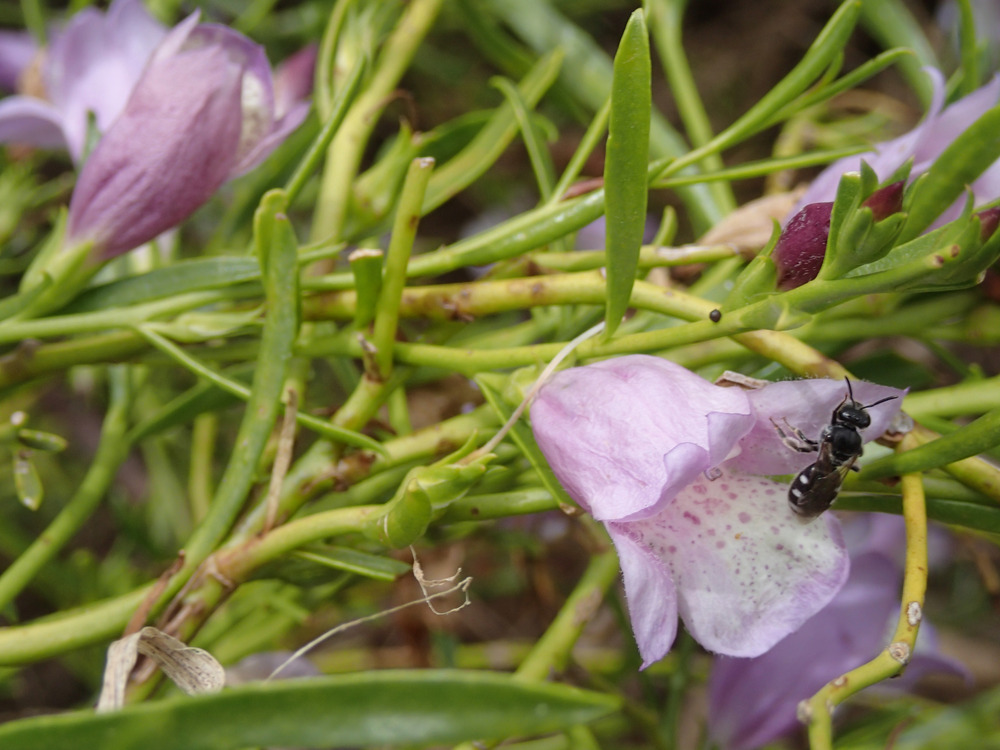

roughbarked said:
This I’m sure is not a fly.
Actually there was two.
One much smaller than the other.
I wonder what the regulatory regime is regarding bee hives etc.
I think you need a permit to establish a hive, do they look at what the impact the hive will have with other hives in the area and what it means for native bees, do they need permission to move a hive when various types of flowers are in bloom?
roughbarked said:
roughbarked said:This I’m sure is not a fly.
Actually there was two.
One much smaller than the other.
A Flower Wasp I would think.
Peak Warming Man said:
I wonder what the regulatory regime is regarding bee hives etc.
I think you need a permit to establish a hive, do they look at what the impact the hive will have with other hives in the area and what it means for native bees, do they need permission to move a hive when various types of flowers are in bloom?
By rights you have to register your hives. Not that everyone does.
Back when I first started with bees, you could have one hive unregistered but if you wanted more than one you had to register.
PermeateFree said:
roughbarked said:
roughbarked said:This I’m sure is not a fly.
Actually there was two.
One much smaller than the other.
A Flower Wasp I would think.
That was my suspicion as well. There are a number of those.
Now all these flies wasps and bees native or otherwise, all have to be wary of flower spiders as there are numerous types of these as well.
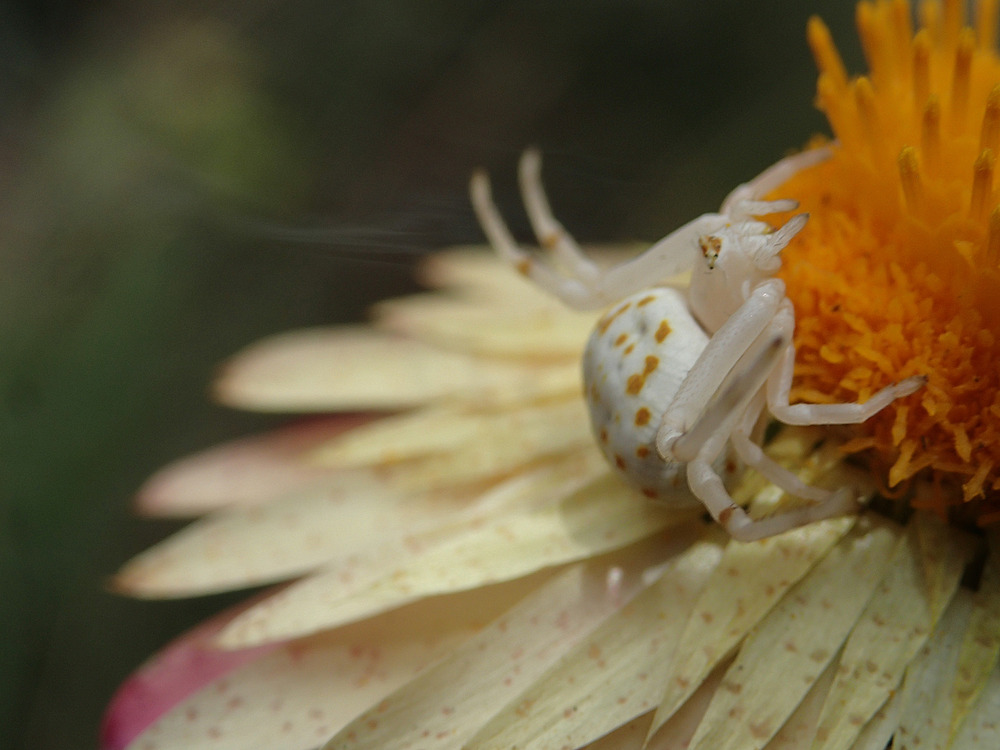
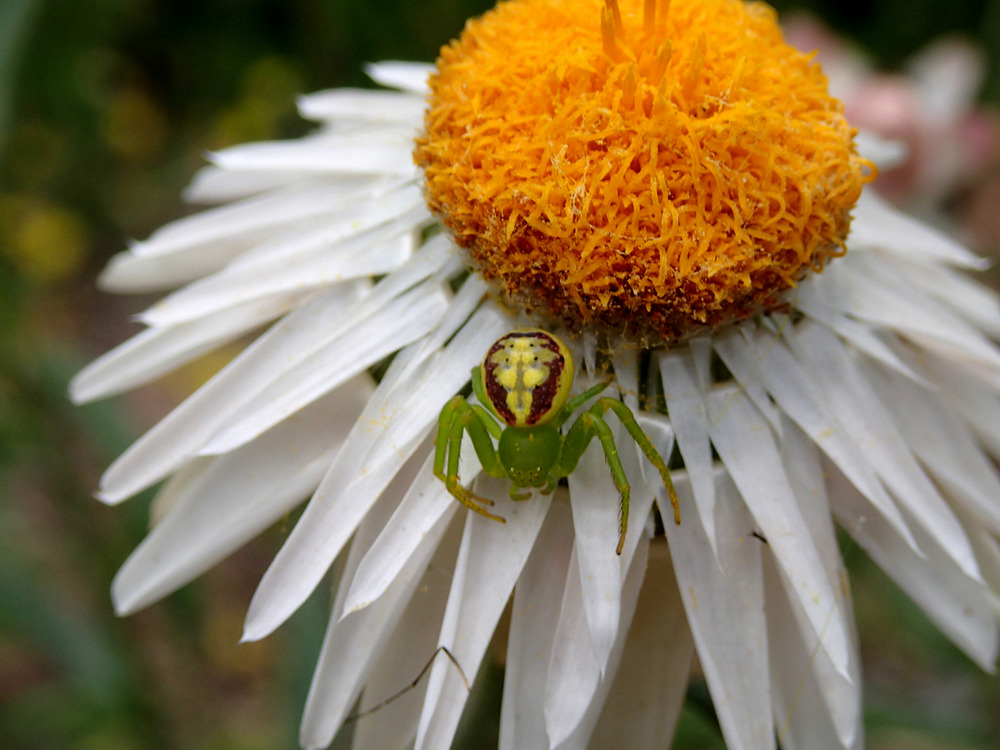
Not sure which fly these are top left.
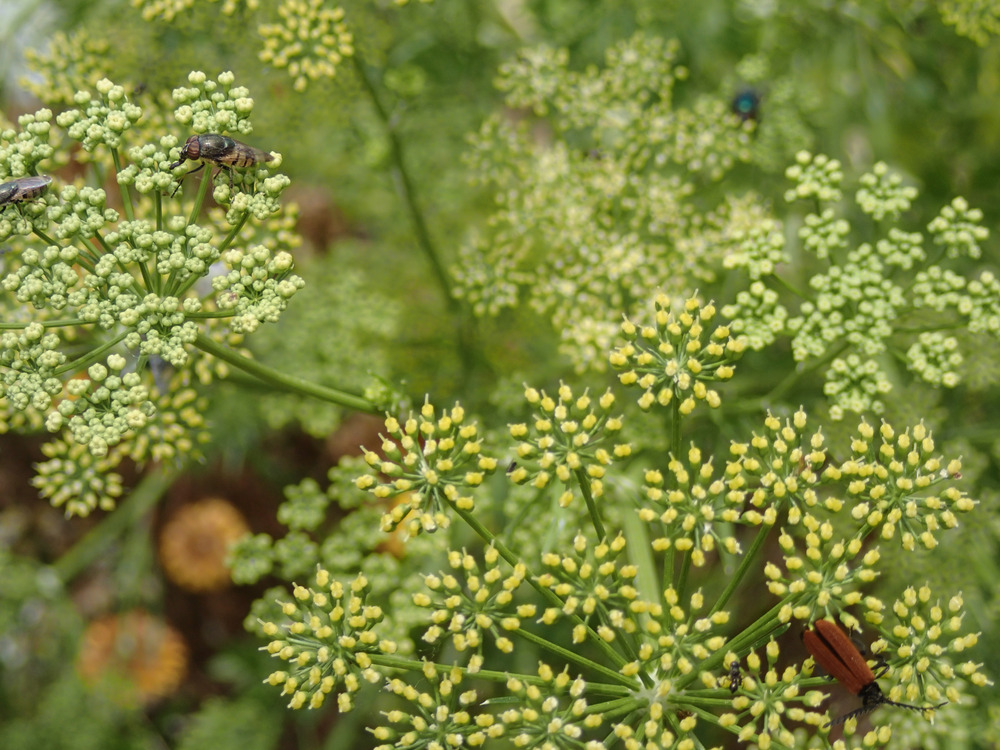
roughbarked said:
Not sure which fly these are top left.
Family Tachinidae – Parasitic Flies. There are over 500 spp. but there are some good id sites on the net for you to trawl through.
PermeateFree said:
roughbarked said:
Not sure which fly these are top left.
Family Tachinidae – Parasitic Flies. There are over 500 spp. but there are some good id sites on the net for you to trawl through.
Yeah, there’s a lot of trawling to be done.
roughbarked said:
Moved here from chat.
Amid deforestation, pesticide use, artificial light pollution and climate change, insects are struggling — along with the crops, flowers and other animals that rely on them to survive.
roughbarked said:
roughbarked said:Moved here from chat.
Amid deforestation, pesticide use, artificial light pollution and climate change, insects are struggling — along with the crops, flowers and other animals that rely on them to survive.
But I mean, I should move the Christmas Beetle rant to here as well, we should rethink why we want cows.
roughbarked said:
roughbarked said:
roughbarked said:Moved here from chat.
Amid deforestation, pesticide use, artificial light pollution and climate change, insects are struggling — along with the crops, flowers and other animals that rely on them to survive.
But I mean, I should move the Christmas Beetle rant to here as well, we should rethink why we want cows.
roughbarked said:
roughbarked said:
sarahs mum said:
https://indynr.com/yeah-yeah-yeah-yeah-christmas-beetles-seem-rare-now/Written by my friend Kym.
I believe there are parameters to observe, recalling that all these huge numbers of Christmas beetles were before the sidewalk cafe customers complained about the flies and we introduced dung beetles in numerous species and numbers. Which is jist one of the parameters. Oddly and I’ll sit down and list them if I bother to, all of this seems to relate to the fact that we prefer cowshit on our paddocks to that of the kangaroo.
They blamed tree dieback on scarab beetles but again oddly, it was in paddocks where cows were.
roughbarked said:
roughbarked said:
roughbarked said:Moved here from chat.
Amid deforestation, pesticide use, artificial light pollution and climate change, insects are struggling — along with the crops, flowers and other animals that rely on them to survive.
But I mean, I should move the Christmas Beetle rant to here as well, we should rethink why we want cows.
I have long said beef cattle should be replaced by macropods.
Tamb said:
roughbarked said:
roughbarked said:
Moved here from chat.
But I mean, I should move the Christmas Beetle rant to here as well, we should rethink why we want cows.
I have long said beef cattle should be replaced by macropods.
The beefeaters will rally against the lack of steak but hey it will be better for all of us. It is a similar argument about the revheads wanting to ressurect all the old cars that should have been recycled so that they can keep on polluting the air.
resurrect?
roughbarked said:
Tamb said:
roughbarked said:But I mean, I should move the Christmas Beetle rant to here as well, we should rethink why we want cows.
I have long said beef cattle should be replaced by macropods.
The beefeaters will rally against the lack of steak but hey it will be better for all of us. It is a similar argument about the revheads wanting to ressurect all the old cars that should have been recycled so that they can keep on polluting the air.
Tamb said:
roughbarked said:
Tamb said:I have long said beef cattle should be replaced by macropods.
The beefeaters will rally against the lack of steak but hey it will be better for all of us. It is a similar argument about the revheads wanting to ressurect all the old cars that should have been recycled so that they can keep on polluting the air.
Roo meat is very tasty as is croc.
It all tastes like chicken anyway, doesn’t it?
roughbarked said:
Tamb said:
roughbarked said:The beefeaters will rally against the lack of steak but hey it will be better for all of us. It is a similar argument about the revheads wanting to ressurect all the old cars that should have been recycled so that they can keep on polluting the air.
Roo meat is very tasty as is croc.It all tastes like chicken anyway, doesn’t it?
roughbarked said:
Tamb said:
roughbarked said:The beefeaters will rally against the lack of steak but hey it will be better for all of us. It is a similar argument about the revheads wanting to ressurect all the old cars that should have been recycled so that they can keep on polluting the air.
Roo meat is very tasty as is croc.It all tastes like chicken anyway, doesn’t it?
Roo doesn’t. It’s taste depends on the grasses it has eaten.
Michael V said:
roughbarked said:
Tamb said:Roo meat is very tasty as is croc.
It all tastes like chicken anyway, doesn’t it?
Roo doesn’t. It’s taste depends on the grasses it has eaten.
Tamb said:
Michael V said:
roughbarked said:It all tastes like chicken anyway, doesn’t it?
Roo doesn’t. It’s taste depends on the grasses it has eaten.
If hens get into the wild mustard their eggs are inedible.
Which wild mustard?
Michael V said:
Tamb said:
Michael V said:Roo doesn’t. It’s taste depends on the grasses it has eaten.
If hens get into the wild mustard their eggs are inedible.Which wild mustard?
Don’t know. We asked a local what was causing the vile tasting eggs & was told wild mustard.
Michael V said:
roughbarked said:
Tamb said:Roo meat is very tasty as is croc.
It all tastes like chicken anyway, doesn’t it?
Roo doesn’t. It’s taste depends on the grasses it has eaten.
I did mean it as a joke. It did generate discussion, so that’s good. :)
Michael V said:
Tamb said:
Michael V said:Roo doesn’t. It’s taste depends on the grasses it has eaten.
If hens get into the wild mustard their eggs are inedible.Which wild mustard?
Wild mustard, also known as charlock, grows rapidly, is frost and drought tolerant, and can be found growing wild in fields and along roads in almost any type of soil. As mentioned, wild mustard plants grow prolifically, a fact that has irritated many a cattle rancher. Cattle growers tend to think of wild mustard as more of a plague since there is a general consensus that when cows eat the plant, they get very sick.
Native to Eurasia, folks have been cultivating wild mustard for 5,000 years, but with its proclivity to grow almost anywhere untended, there’s almost no reason to cultivate it. Wild mustard plants grow almost everywhere on earth including Greenland and the North Pole. Wild mustard has commonly been used to flavor foods, but more importantly wild mustard has been known for its herbal uses. A truly fascinating plant with a myriad of uses, read on to find out how to use wild mustard as an herb in the landscape.
Read more at Gardening Know How: Tips For Cultivating Wild Mustard As An Herb https://www.gardeningknowhow.com/edible/herbs/wild-mustard/growing-wild-mustard-herb-plants.htm
roughbarked said:
Michael V said:
Tamb said:If hens get into the wild mustard their eggs are inedible.
Which wild mustard?
Wild mustard, also known as charlock, grows rapidly, is frost and drought tolerant, and can be found growing wild in fields and along roads in almost any type of soil. As mentioned, wild mustard plants grow prolifically, a fact that has irritated many a cattle rancher. Cattle growers tend to think of wild mustard as more of a plague since there is a general consensus that when cows eat the plant, they get very sick.
Native to Eurasia, folks have been cultivating wild mustard for 5,000 years, but with its proclivity to grow almost anywhere untended, there’s almost no reason to cultivate it. Wild mustard plants grow almost everywhere on earth including Greenland and the North Pole. Wild mustard has commonly been used to flavor foods, but more importantly wild mustard has been known for its herbal uses. A truly fascinating plant with a myriad of uses, read on to find out how to use wild mustard as an herb in the landscape.
Read more at Gardening Know How: Tips For Cultivating Wild Mustard As An Herb https://www.gardeningknowhow.com/edible/herbs/wild-mustard/growing-wild-mustard-herb-plants.htm
In Australia we also have Mustard weed.
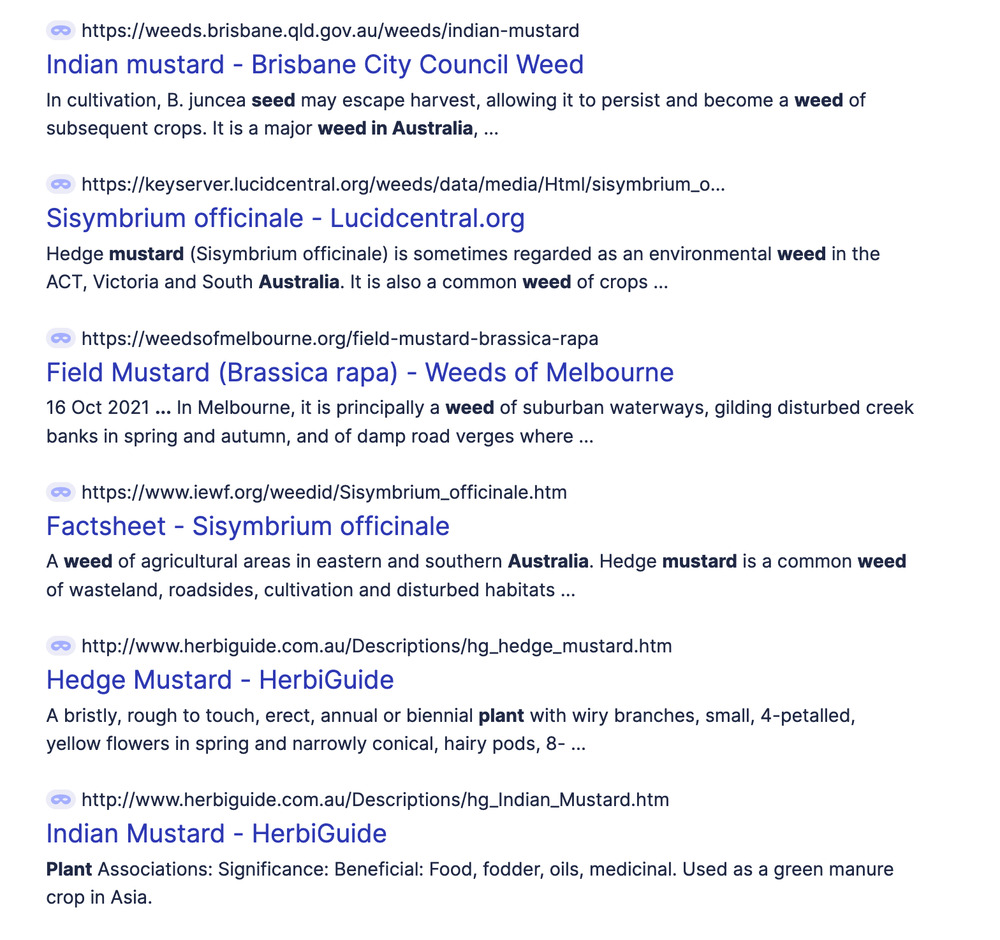
roughbarked said:
roughbarked said:Moved here from chat.
Amid deforestation, pesticide use, artificial light pollution and climate change, insects are struggling — along with the crops, flowers and other animals that rely on them to survive.
TY for Moving It
otherwise I’d have mist it entirely
slightly off topic but:
can you locate the pict you’d taken of The BLUE BEE ?
i’d love to see it again
More than one blue bee.
roughbarked said:
roughbarked said:
Michael V said:Which wild mustard?
Wild mustard, also known as charlock, grows rapidly, is frost and drought tolerant, and can be found growing wild in fields and along roads in almost any type of soil. As mentioned, wild mustard plants grow prolifically, a fact that has irritated many a cattle rancher. Cattle growers tend to think of wild mustard as more of a plague since there is a general consensus that when cows eat the plant, they get very sick.
Native to Eurasia, folks have been cultivating wild mustard for 5,000 years, but with its proclivity to grow almost anywhere untended, there’s almost no reason to cultivate it. Wild mustard plants grow almost everywhere on earth including Greenland and the North Pole. Wild mustard has commonly been used to flavor foods, but more importantly wild mustard has been known for its herbal uses. A truly fascinating plant with a myriad of uses, read on to find out how to use wild mustard as an herb in the landscape.
Read more at Gardening Know How: Tips For Cultivating Wild Mustard As An Herb https://www.gardeningknowhow.com/edible/herbs/wild-mustard/growing-wild-mustard-herb-plants.htm
In Australia we also have Mustard weed.
Which is why I asked Tamb the question. (There are several other wild mustards in Australia, too.)
Tamb said:
Michael V said:
Tamb said:If hens get into the wild mustard their eggs are inedible.
Which wild mustard?
Don’t know. We asked a local what was causing the vile tasting eggs & was told wild mustard.
Ah, thanks.
Peak Warming Man said:
I wonder what the regulatory regime is regarding bee hives etc.
I think you need a permit to establish a hive, do they look at what the impact the hive will have with other hives in the area and what it means for native bees, do they need permission to move a hive when various types of flowers are in bloom?
AFAIK, it is an industry that is focused on making money from honey while purporting to be an essential pollinator for crops which the industry also makes money from.
I found one mention of the word ‘native’ on this page. https://www.agriculture.gov.au/biosecurity-trade/pests-diseases-weeds/bees
This may take longer to read in depth. https://agrifutures.com.au/wp-content/uploads/2021/02/20-136.pdf
However it does contain thos.
“For the period 1962 to 1985, ‘commercial beekeeper’ was defined by the Australian Bureau of Statistics (ABS) as a beekeeper who managed more than 40 hives. ABS ceased collecting this data in the 1980s, and subsequent periodic surveys by the Australian Bureau of Agricultural and Resource Economics and Sciences (e.g. ABARES, 2003, 2008, 2016) defined a commercial beekeeper as one who manages 50 or more hives.”
INQUIRY INTO BEEKEEPING IN URBAN AREAS
Rules and regulations for beekeeping in Australia
Article
A Systematic Review of Urban Beekeeping Regulations of Australia, the United States, and Japan: Towards Evidence-Based Policy Making